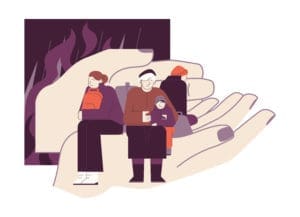When the United States pulled out of Afghanistan, the U.S. government recognized a need to take care of vulnerable Afghan citizens. On August 29, 2021, Operation Allies Welcome was introduced to coordinate efforts to assist Afghan refugees seeking asylum in the United States. The program includes establishing the Unified Coordination Group (UCG) that reports directly to the Secretary of Homeland Security and is responsible for initial processing, COVID-19 testing, medical services and isolations, and screening and support at pre-designated U.S. military bases. Yet despite these efforts, Afghan refugees still face many challenges.
 The system is backlogged.
The system is backlogged.
When the U.S. withdrew, 76,000 at-risk Afghans were evacuated and admitted to the States, and tens of thousands are still waiting for approval. Upon arrival, the government provided them with humanitarian parole that provided temporary authorization to be within our borders. However, those individuals must obtain a permanent status: asylum or a special immigrant visa (SIV). Both routes are severely backlogged, and the requirements for SIV have been difficult to meet. As of December 2021, an estimated 18,000 SIV cases were waiting for review, and the overall asylum system had about one million cases backlogged.
As a result, six U.S. Senators introduced the Afghan Adjustment Act to provide Afghan refugees who have temporary status in the U.S. to more easily apply for lawful permanent residence and eventually citizenship. This program will broaden the SIV’s eligibility to include groups and individuals that worked alongside American military forces and government personnel.
Once admitted, life is challenging for Afghan refugees.
In February 2022, the Department of Homeland Security announced all Afghan refugees temporarily housed on U.S. military bases would be rehomed to communities throughout the country. However, with the housing shortage in the States, finding affordable housing has been difficult or impossible for many. Although many nonprofit organizations throughout the country are dedicated to helping rehome refugees, they report that the lack of affordable housing forces many refugees to live in hotels–which is not a viable long-term solution.
Another significant issue for these refugees is the ability to find paying jobs. Even those holding university degrees from Afghanistan find it difficult to find work, despite a substantial labor shortage across the country. Stigma about immigrants remains prevalent, making it hard to establish independence in the States. Many resort to minimum wage jobs even though they have education and experience for more advanced positions.
Qualified translation services can make the process more efficient.
If you or someone you are working with is seeking asylum or applying for a special immigrant visa, contact The Perfect Translation. The application process for obtaining refugee status or an SIV can be complex and confusing. Most applicants need translation services to convert required documents from their native language to English. The Perfect Translation provides accurate, legal translation services by highly skilled translators with experience handling immigration applications and working with the USCIS. You won’t find that level of expertise in automated translation software programs. Contact us today to discuss your project and receive a free quote.

 The system is backlogged.
The system is backlogged.
Leave a Reply